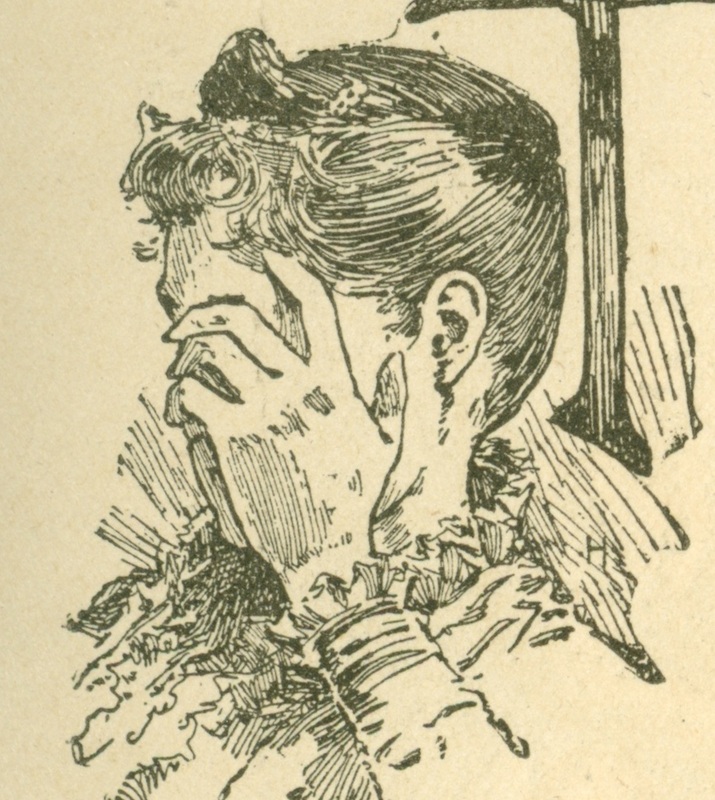Historical Article (1888)
Music As She Is Executed:
A Society For the Prevention of Cruelty to Music
Good Housekeeping, 1888
OUR text is, that four fingers and a thumb on either hand, and the feminine sex, does not necessarily imply a talent for music, as some people would insist. To a real lover of music it is indescribable torture to listen hour after hour all through the lovely, and otherwise peaceful summer days to our neighbor's daughters as they drum out "one, two, three four," in five finger exercises on a third grade piano badly out of tune. The one thing left to be thankful for is that they have not six fingers, and consequently we are spared the infliction of listening to six finger exercises. From rosy morn to dewy eve the doleful tones ring out from one house after another. If they would but settle upon some certain time for their practicing, the rest of us could leave the neighborhood during the fatal period, or be put under the influence of opiates, or seek escape in some other way.
It has been suggested that a musical pest-house be erected far away from human habitation, where these musical devotees could do their worst until the disease had run its course. It only needs some philanthropic soul with money - and the world has no use for philanthropic souls without money - to put this theory into practice, and cause all people, whose neighbor's daughters have musical aspirations, to rise up and call him blessed.
There are in our neighborhood fourteen malignant cases of piano-phobia and the malady is still spreading. In two houses the disease has appeared in the form of violinia. One, especially, is a very severe case. It would appear that all the old masters had been boiled down, skimmed off and their concentrated essence poured into this young person. Far into the solemn night the instrument pours forth its despair. The mother of this useful prodigy seizes you by the arm saying: "Listen to this strain." We listen for several reasons, the principal one being that we can't help it. We are forming a habit of listening to this strain that it is rapidly becoming second nature. "Is not it suggestive of the wail of a lost soul?" the appreciative mother asks. Yes it is, or the urgent need of a strong dose of Jamaica ginger.
But the pent up genius of his soul is not to be smothered by the wet blanket of discouraging remarks made by those who have no music in their souls, but plenty poured into their ears. He saws away indefatigueably and at this rate will soon be equal to Paganini - or any other ninny.
Even this is not the worst. One would naturally expect to hear something "sweetly solemn" at the churches. But if you have a sense of the ludicrous you will feel anything but solemn when the deep chested bass who weighs 200 pounds, "Oh's fo the wings of a dove that he may fly away and be at rest." It is so ridiculous for a person to wish for anything so useless and inappropriate that we turn to the soprano for relief, but she, clad in velvet and satin proclaims to the "Man of Sorrows" that she "her cross has taken all to leave and follow him, and that naked, poor, despised, forsaken, He from hence her all shall be." Nothing sounds ridiculous from the lips of the handsome young tenor, and should he chant to us some Sabath morning, in the tones of an archangel, that the moon was m-a-d-e-o-f-g-r-e-e-n-c-h-e-e-s-e, it would be implicitly believed by the younger females of the congregation at least.
Attending service not long ago, in an elegant church edifice where they worship God with taste in a highly aesthetic manner, the choir began that scriptural poem that compares Solomon with the lilies of the field, somewhat to the former's disadvantage. Although never possessing a great admiration for Solomon, nor considering him a suitable person to hold up as a shining example before the Young Men's Christian Association, still a pang of pity for him was felt when the choir, after expressing unbounded admiration for the lilies of the field, which it is doubtful if they ever observed very closely, began to tell the congregation through the mouth of the soprano that "Solomon in all his glory was not arrayed." Straightway the soprano was reinforced by the bass, who declared that Solomon was most decidedly and emphatically not arrayed - was not arrayed. Then the alto ventured it as her opinion that Solomon was not arrayed, when the tenor without a moments [sic] hesitation sang as if it had been officially announced that "he was not arrayed." Then when the feelings of the congregation had been harrowed up sufficiently, and our sympathies all arounds for poor Solomon, whose numerous wives allowed him to go about in such a fashion even in that climate; the choir altogether in a most cool and composed manner informed us that the idea they intended to convey was, that Solomon in all his glory was not arrayed "like one of these." These what? So long a time had elapsed since they sang of the lilies that the thread was entirely lost, and by "these," one naturally concluded the choir was designated. Arrayed like one of these? We should think not indeed! Solomon in a Prince Albert or cutaway coat? Solomon with an eye-glass and moustache, his hair cut pompadour? No, most decidedly. Solomon, in the very zenith of his glory was not arrayed like one of these.
Despite the experience of the morning, the hope still remained that in the evening a sacred song might be sung in a manner that would not excite our risabilities or leave the impression that we had been listening to a case of blackmail. But again off started the nimble soprano with the very laudable though rather startling announcement - "I will wash." Straightway the alto, not to be outdone, declared she would wash. And the tenor finding it to be the thing warbled forth he would wash. Then the deep-chested basso as though calling up all his fortitude for the plunge, bellowed forth the stern resolve that he also would wash. Next a short steam or splash of the waves, after which the choir individually and collectively asserted the firm, unshaken resolve that they would wash. At last they solved the problem by stating that they proposed to "wash their hands in innocency, so will the altar of the altar of the Lord be compassed."
But surely if half this torture was inflicted on sentient beings, the humane society would be up in arms about it. The philanthropic men would write tracts, deliver addresses, and found homes for their relief. The philanthropic women would give charity balls, concerts, fairs, and read the Bible to them. How do we know that music is not conscious of all this ill-treatment? After hearing the performance of an artist, who can say the instrument has no soul? A soul it may be that sleepeth until awakened into life by the touch of the master. Let a society be formed at once that will see that the masters treat it kindly and with respect.
***
Back to Historical Articles Index
***
If our website has been helpful to you and you appreciate the information which we've put a tremendous amount of time and energy into providing, please consider making
a cash donation.
Your generous support helps us maintain this website and continue our outreach, so that we can keep teaching others about the history we love.
Everything helps and is appreciated!
***
In a seaport town in the late 19th-century Pacific Northwest, a group of friends find themselves drawn together —by chance, by love, and by the marvelous changes their world is undergoing. In the process, they learn that the family we choose can be just as important as the ones we're born into. Join their adventures in
The Tales of Chetzemoka
A Trip and a Tumble:
A Victorian Cycling Club Story
Buy the Book
Learn More
For Tales of Chetzemoka merchandise,
click here!
***
Anthologies
Words For Parting
Victorian Poetry on Death and Mourning
True Ladies
and
Proper Gentlemen
Non-fiction
Search this website:
***













